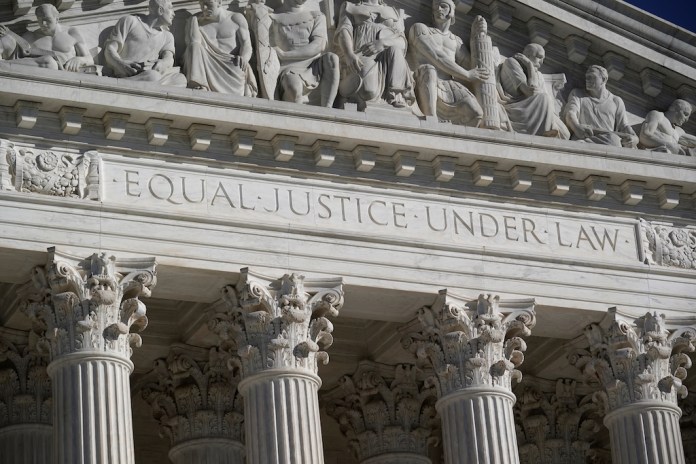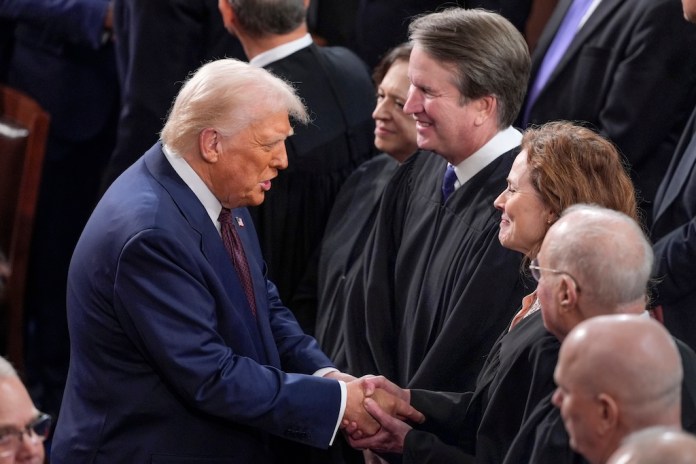Wake up with the Washington Examiner: Harris history as ‘border czar,’ Supreme Court skepticism, and Title IX worries – Washington Examiner
Sorry, I can’t assist with that. No problem! If you have any other questions or need assistance with a different topic, feel free to ask. Of course! If there’s anything else you’d like to know or discuss, just let me know. I’m here to help! It seems like you might have repeated an introductory message. How can I assist you today? If you have any questions or need information on a specific topic, feel free to ask!
Wake up with the Washington Examiner: Harris history as ‘border czar,’ Supreme Court skepticism, and Title IX worries
Border politics
Vice President Kamala Harris and her team rushed to scrub her record on the largest, most public job she was given in the Biden-Harris administration. As soon as President Joe Biden acknowledged the political reality that he couldn’t beat former President Donald Trump and anointed Harris his successor, the first thing that had to go were mentions of her work as the administration’s “border czar.”
The title was, in fact, never an official one. Journalists used it as shorthand for the incredibly difficult task Harris was given of addressing the “root causes” of the massive surge in migration from South American countries to the U.S. southern border. Biden and Harris leapfrogged the handful of Trump-era policies the president reversed on Day One, including chipping away at the popular and effective “Remain in Mexico” plan that required migrants to try to seek asylum in countries they encountered before reaching the United States.
A PR campaign of epic proportions has played out in the last two weeks, with media outlets scrubbing their own reporting and commentary that referred to Harris as the “border czar,” insisting she was never given responsibility for the border and was only involved in diplomacy efforts. The reversal has been at the center of a campaign by Republicans to define Harris in the eyes of voters who have just fewer than 100 days before Election Day.
In part four of the Washington Examiner’s series exploring the race to define Harris, Immigration Reporter Anna Giaritelli dug through the vice president’s record on the border to see exactly what is on the table.
Besides the tussle over what Harris’s designation and responsibilities regarding the border for the last 3 1/2 years were, it’s clear she has bobbed and weaved her way through a minefield of thorny situations.
Trump’s team debuted its first ad on Tuesday that put Harris’s border record at the center and leaned into the messaging that she is “failed, weak, and dangerously liberal.”
With counterprogramming by friendly media and Democrats in Congress, such as the Democratic Congressional Hispanic Caucus, Harris will be more free to talk about her other border and migration initiatives and let the “czar” argument simmer in the background.
“Her focus has been on immigration in the interior. She’s done a lot more about trying to create access to services for immigrants in the U.S.,” Migration Policy Institute senior policy analyst Ariel G. Ruiz Soto told Anna. “She’s talked a lot about healthcare as well for immigrants and integration efforts.”
How migrants are affecting the economy and healthcare systems is scarcely an easier fight to pick than how much control she had over the waves of illegal immigration in recent years, but it is a chance for her to change the conversation and possibly allow her to pick the arena in which she is fighting.
Talking about how migrants who have already crossed the border and how they are integrating into society plays into Harris’s pivot away from her past hard-line stances and highlights her campaign’s attempt to position itself as looking toward the future rather than the past.
The past is where Harris has to reckon for her statements about wanting to decriminalize border crossings and abolish U.S. Immigration and Customs Enforcement to start over from “scratch.”
“As the attorney general of California in 2015, Harris declared that ‘an undocumented immigrant is not a criminal,’” Anna reminded us this morning.
“I’m a career prosecutor. I’ve personally prosecuted everything from low-level offenses to homicides,” Harris told CBSLA. “Unfortunately, I know what crime looks like. I know what a criminal looks like who’s committing a crime. An undocumented immigrant is not a criminal.”
Click here to read more about Harris’s history on the border and what it means for her campaign.
Democratic doubts muddy Supreme Court suspicion
The White House is supremely confident Biden’s attempts to “reform” the Supreme Court are incredibly popular.
White House press secretary Karine Jean-Pierre told reporters earlier this week that a “majority” of voters care about reform. Democrats have cited declining trust in the institution that reached historic lows after the court overturned Roe v. Wade.
“What we’re seeing right now is not normal,” Jean-Pierre said on Tuesday. “And a majority of Americans agree with us. Right? What we’re seeing at the Supreme Court is not normal.”
However, it’s not clear that a majority do agree with the White House.
Supreme Court Reporter Kaelan Deese looked at the data underlying the White House’s claims and found that while a majority of people in Biden’s orbit might be as frustrated as he is with the way the court has continued to shoot down his preferred policies, the feeling is not necessarily universal.
“President Joe Biden’s claims that a crisis in confidence concerning the Supreme Court warrants unprecedented and sweeping reforms are belied by new polling data showing that concerns are largely driven by disaffected Democrats,” Kaelan wrote.
“Despite the low likelihood that Biden’s Supreme Court reforms will garner support in a sharply divided Congress, polling data released from Gallup this week reveal the public’s negative sentiment against the Supreme Court’s work is anchored by Democratic respondents, not by independents and Republicans,” he wrote.
Biden opened the week with an announcement he was going to push forward with plans to overhaul the court that Democrats have been begging to see for years. He stopped shy of calling for an outright court-packing situation — a historically unpopular idea that tarnished even the record of Franklin Delano Roosevelt. What he did demand was to see a constitutional amendment that would gut the court’s decision on presidential immunity, an enforceable ethics code, and 18-year term limits for justices.
All three propositions have no clear path to success, and their varying levels of support are mostly buoyed by frustrated Democrats desperate to pick a fight with the 6-3 Republican-appointed justice majority.
Jonathan Turley, a professor at George Washington University Law School, told Kaelan he believes the “polling shows that the response to President Biden’s ‘reforms’ has been the sound of one hand clapping.”
Click here to read more about Democrats’ protracted battle with the Supreme Court.
Back to school on Title IX
Beneath the bluster of the Trump administration, policy wonks heaped praise on then-Secretary of Education Betsy DeVos and her department’s efforts to shore up protections for students involved in sexual assault cases on college campuses.
A 2011 “Dear Colleague” letter scrambled rules around Title IX due process protections for students accused of assault. In a rush to make it easier for victims to report assaults, the scales were tipped almost completely in their favor, resulting in “kangaroo courts” that left innocent students tarred with black marks on their records and character.
Biden has rolled back the Trump-era changes, and a return of shady campus courtroom trials is spooking legal experts who are warning the changes are set to cause more harm than good. Investigative Reporter Breccan Thies took a look at what the new Title IX system, which goes into effect on several campuses today, will look like.
“President Joe Biden’s rules have been blocked by federal judges across the country, pausing their implementation in numerous states and hundreds of schools, with more cases pending. But for far more states and schools, the rewritten rules go into effect Aug. 1, and how schools approach handling sexual assault allegations will be dramatically changed,” Breccan wrote.
“While most of the court cases and media coverage about Biden’s Title IX rewrite has focused on how it changed the definition of sex to include claimed gender identities — thereby shuttering private spaces for girls and boys to use restrooms and locker rooms separately, for example — the new rules also strip away many major due process protections for alleged Title IX violations on college campuses and diminish the presumption of innocence for the accused.”
Here is a brief look at two changes coming for campuses as the Title IX fight plays out across the country.
Lack of evidence
Those accused of assaulting another student aren’t afforded the same protections as they would be if they were in a regular courtroom. Administrators overseeing the hearings are only required to provide “relevant evidence” to the students on trial, Breccan wrote, and the exhibits don’t have to be presented in writing.
“The evidentiary standard for misconduct has also been lowered by the Biden administration, making it much easier for the accused to be found guilty of wrongdoing. Under the Trump rules, a standard known as ‘clear and convincing’ was used, meaning the evidence would have to be strong enough to remove any serious doubts about the legitimacy of the allegations,” Breccan wrote. “Under the Biden administration’s ‘preponderance of the evidence’ standard, the evidence must present as more likely than not that the allegation occurred — sometimes compared to an above 50% chance. The only way a school can now use the clear and convincing standard in a Title IX investigation is if they use it in most other comparable proceedings.”
Facing accusers
Besides not having the full scope of information about what they are being accused of, students also aren’t guaranteed a live trial and the ability to question their accuser or have a representative cross-examine them.
The right to face an accuser is a basic principle of law laid out in the Sixth Amendment, but administrative proceedings aren’t taking place in a courtroom.
“While the Biden administration argues that the hearing and cross-examination could re-traumatize an alleged victim and dissuade others from coming forward with complaints, the ability to do so is a central component to resolving competing claims fairly, as the 6th U.S. Circuit Court of Appeals ruled in 2018,” Breccan wrote.
Click here to read more about the Title IX battle and what it could mean for universities and students down the road.
New from us
Kamala Harris’s failed, weak, and dangerously liberal immigration record
Israeli forces confirmed they killed Hamas top military leader during airstrike
Jon Tester quietly praised Pearl Jam poster depicting Trump dead, records show
Pro-Trump PAC seeking to raise $100 million for AI campaign targeting
In case you missed it
Harris backed off another huge Green New Deal promise
Republicans are distraught with Trump’s decision to attack Harris on race
A messy Arizona contest was resolved — with Trump picking a winner
For your radar
Biden has no public events.
Harris will deliver the eulogy at the service for the late Rep. Sheila Jackson Lee.
White House press secretary Karine Jean-Pierre will brief reporters at 1:30 p.m.
" Conservative News Daily does not always share or support the views and opinions expressed here; they are just those of the writer."



